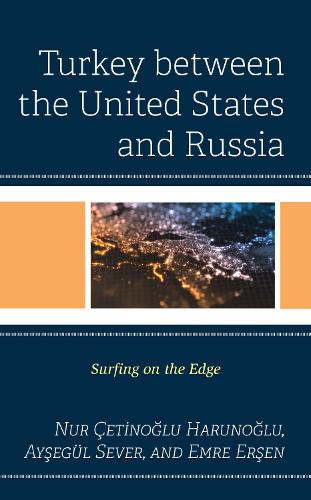
Turkey between the United States and Russia: Surfing on the Edge
(Hardback)
Publishing Details
Turkey between the United States and Russia: Surfing on the Edge
By (Author) Nur etinoglu Harunoglu
By (author) Aysegl Sever
By (author) Emre Ersen
Bloomsbury Publishing PLC
Lexington Books
21st September 2021
United States
Classifications
Professional and Scholarly
Non Fiction
General and world history
327.561073
Physical Properties
Hardback
196
Width 160mm, Height 228mm, Spine 21mm
499g
Description
Current debates on Turkish foreign policy flamed by Turkeys purchase of S-400 air defense systems from Russia throws into question Turkey-US relations and poses a challenge to Turkeys membership in NATO, which has been regarded as the most important symbol of Turkeys alliance with the West. However, Turkeys maneuvers between the US and Russia are not unique to the present era as they can be traced back to the Cold War period. In fact, Turkeys alliance with the West did not prevent Turkey from establishing special relations with the Soviet Union. This book, which is spurred by Glenn Snyders theory on alliance politics, indicates that Turkeys foreign policy moves shaped in accordance with the fear of abandonment and the fear of entrapment with regards to its relations with the US, did not only stay within the boundaries of the Cold War, but further moved beyond that era. The authors argue that Turkeys maneuvers to balance the US with Russia in the historical context constitute a strong element of continuity and a significant pattern in Turkish foreign policy. Yet, the authors underline that the motives behind this legacy have changed in the 2010s due to the transformations occurred within global, regional as well as domestic contexts.
Reviews
This informative and analytically robust monograph explores how Turkey's relations with the United States and Russia have evolved in parallel since the end of the Cold War. It outlines Turkey's balancing act, tactical maneuvers, and shifts in orientation in relation to the two powers and, crucially, sets them in the historical context of the Cold War. The book will constitute a valuable point of reference for academics, students, and policymakers alike for years to come.
--Katerina Dalacoura, London School of Economics and Political ScienceThis is a timely and meticulously researched book that presents a compelling analysis of Turkey's complex relations with the United States and Russia. The study presents valuable insights by examining Turkey's relations with the United States and Russia in parallel with each other in a historical context, as well as in relation to current debates regarding Turkish foreign policy from a more analytical perspective. This is a must-read in the field of Turkish foreign policy.
--Suhnaz Yilmaz, Ko UniversityThis timely volume examines the motivations behind Turkish foreign policy as it maneuvers between maintaining its traditional Western orientation and bolstering its relationship with Russia. Adopting a historical and analytical perspective, it demonstrates both that Turkey's apparent drift away from the West is not entirely new and that its reengagement with Russia is driven by a host of global, regional, and domestic factors. This book will be of great interest to policymakers, academic specialists, and students of Turkish foreign policy.
--Paul Kubicek, Oakland UniversityAuthor Bio
Nur etinolu Harunolu is assistant professor of international relations at Marmara University.
Ayegl Sever is professor of international relations at Marmara University.
Emre Eren is professor of international relations at Marmara University.
